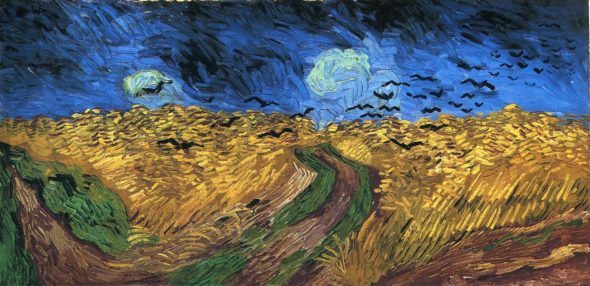

"Wheatfield with Crows," Vincent van Gogh, 1890. (Via Wikiart.org)
First Lines — October, catching fire
- Published: October 25, 2019
Sometimes the world hurts. Sometimes our hearts are rubbed raw. And sometimes every note we hear is harsh.
Poems can speak to and of these darker experiences. Not all poems marvel or praise. Some embrace the bleakness. Among American poets, Robert Frost is perhaps the grandfather of a certain kind of harshness or darkness. Frost sees and accepts the quiet violence and corrosive losses of life. He makes music of them. Not to push them away, but to bring them harrowingly close — into the pit of the heart.
This month’s poem, by MJ White of Xenia, is in a “Frostian” tradition, I think. Frost happens to be a poet that MJ admires. And some of her work carries his sternness, as well as his clarity. MJ is a former teacher at Mills Lawn School who retired in 2001. She has been writing seriously since retirement, earning a master’s degree in writing from Wright State and, two years ago, releasing her first book, “How the Universe Says Yes to Me.” That title may sound inspirational. But MJ being MJ, the universe’s “yes” is not what you want or expect. It might be tragic, or tragically comic.
MJ’s poem for the News begins, “October, finally catching fire, burns around us….” Pay attention to that “finally.” Already in the poem’s second word we sense impatience, or weariness. This mood suffuses the poem. Or burns inside it.
Phoenix
October, finally catching fire, burns around us
as we walk; a crow follows, flying tree to tree
cawing profanely, hurling imprecation earthward,
its harsh call absent any commiseration,
as though ripped from a waning year’s headlines
it contains no civility, no hint of comity.
Sequentially immolating itself, the corvid sinks
into leafed crowns flaming yellow, orange, red above us,
only to rise again, and again, into the blued autumnal air.
—MJ White
One of the joys of MJ’s poem is its sonics, the sound of its words. I hear a flock of “m” sounds: “imprecation,” “commiseration,” “comity,” “immolating,” “autumnal,” among others. These are soft sounds, set against (or contained within) the poem’s harder “c” and “f” sounds. The music this poem makes is the music of wings, the soft mixed in with the hard.
A closely related joy is this poem’s diction — the fancy term for a poet’s choice and use of words. MJ’s diction is impeccable! Those “m” words I just identified are also examples of the poem’s precise, sophisticated word choices. And that’s why, in my experience of this poem, a certain suffocation arises from their use. I feel a bit strangled, without air, desperate for a way out — but trapped by words.
That is the experience MJ is summoning, I think. The sound of the crows, and the perverse persistence of that sound, seems “ripped from the waning year’s headlines.” Will they ever stop, or change? No! The discordance goes on and on: “only to rise again, and again.” And repetition brings despair. For where do the crows, cawing, cawing, go? Down into the trees and back up again (and again) “into the blued autumnal air.”
Linger on that word “blued.” How different from the purity of “blue”! I think of “bluing,” the laundry agent used to counteract dinginess. I think of the blues. And, upon looking up the word, I discover that to “blue” metal is to heat it to a certain hardness so that it acquires a bluish coating. All of those meanings shade into the poem’s close.
And what of the poem’s first word, its title? It’s helpful to recall that the phoenix, in Greek mythology, was a long-lived bird reborn from the ashes of its predecessor. Some version of the phoenix appears in many cultures as a symbol of regeneration and rebirth. Yet here, in the Frostian atmosphere of MJ’s poem, that symbol of regeneration, in the body of an ordinary crow, is something that refuses to depart — not eternal life, but a kind of hell.
This poem’s bleakness is its clarity. (Its “blued” air, perhaps.) Who among us hasn’t felt — not abstractly, but viscerally — the lack of civility and comity that strangles our political and social life? And who among us hasn’t longed, and longed, for release?
*This column originally appeared in the Oct. 17 issue of the News. To read other First Lines poetry columns, visit the archive page here.










Comments are closed for this article.